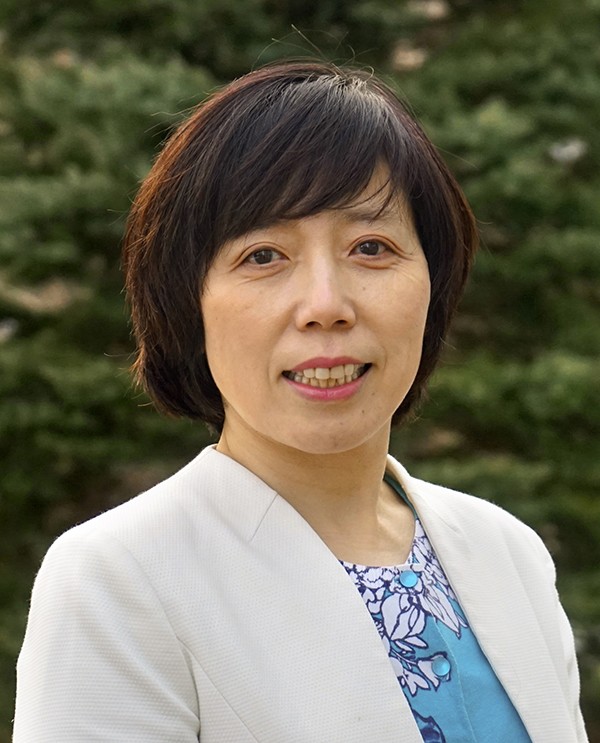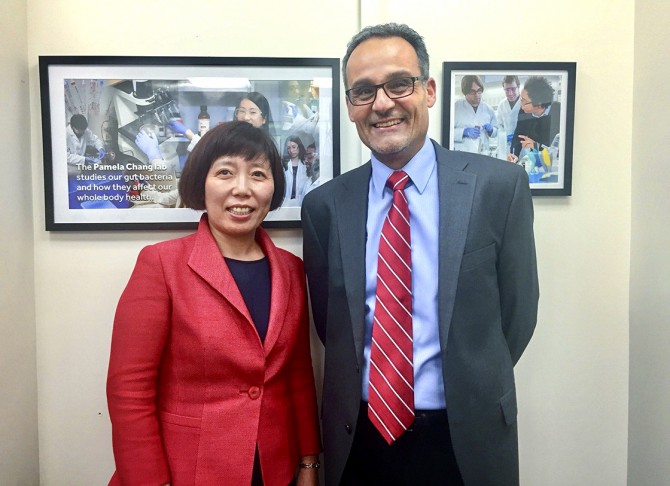Alice Li, Ph.D. '98, is executive director of Cornell's Center for Technology Licensing (CTL), the university's technology transfer office. She oversees activities in technology management, marketing, licensing and outreach to support the university's goals in commercializing technologies, promoting startups and building partnerships.
Universities have been playing increasingly important roles in driving a knowledge-based economy and propelling new venture formation nationwide. At Cornell, more than 200 startup companies based on licensed Cornell technologies have been launched since 1990, with more than $2.6B in funding raised.
Can you tell us a bit about your background and what brought you to Cornell?
Li: I was trained at Cornell as a Ph.D. student in molecular biology. Right after my graduation, I joined a startup company called BioArray Solutions in New Jersey. At the time, DNA and protein chips were hot, and we had a new system that could be used in diagnostics. It was both an exciting and nerve-racking experience to grow from a two-person startup to over 50 people. That's where I filed my first patent as an inventor, learned what investors are looking for, and figured out how to build lab benches using "retired" materials.
I returned to Ithaca in 2002, when my husband was offered a faculty job in the College of Engineering, but I wanted to stay with industry. I was introduced to tech transfer, and the fact that it bridges academia and industry piqued my interest. I joined the CTL office and started to manage a portfolio of life sciences technologies. I have to admit, in the beginning there were urges to start other companies of my own, but gradually I became more and more engaged in helping others in their commercialization efforts instead.
It's such a rewarding experience to link a university's discovery power to the development arms of industry and to help pump new blood into the startup landscape. Tech transfer has been an evolving field over the last 20 years, and I was growing along with the profession. I became CTL's executive director, first in an interim capacity in 2014 and then officially in 2016. I am inspired to make the organization an effective interface between Cornell researchers and our industry partners.
What is CTL's role today, and how involved has it been in the recent growth of Cornell-created patents, licenses and startups?
Li: When people hear "tech transfer," they typically think about filing patents. In reality, patents are just sheets of paper - expensive sheets of paper - if they do not result in products. The focus of the field has gradually shifted to commercialization: how technologies can be marketed and licensed to industry and developed into products and services with societal impact. More recently, the emphasis was expanded to support startup formation and growth, utilizing inventions as the engine for economic growth to benefit the region and the nation. Corporate engagement also recently has become a major part of the comprehensive approach for partnerships.
Through its central role in intellectual property management, marketing and licensing, CTL works and coordinates with all of Cornell's colleges and campuses to catalyze the commercialization of technologies, establish partnerships and form startups. Every year Cornell is awarded more than 100 U.S. patents and enters into more than 75 licenses and options with industry partners. In the 2019 Reuters' ranking of the world's most innovative universities, Cornell ranked ninth.
Just as it takes a village to raise a child, it takes an ecosystem to nurture a startup. CTL is part of a well-developed ecosystem that supports entrepreneurship at Cornell, one that has seen tremendous growth in recent years. CTL helps faculty and student entrepreneurs alike to take advantage of a wealth of opportunities that the university offers, such as technology incubators, translational research centers, training programs for students and researchers, business plan competitions and maturation funds. The Startup Guide was created by CTL as a part of the toolbox to introduce faculty and students to the venture path and the rich resources at the campuses of Cornell.
Over the past decade, technology-focused incubators - like the Kevin M. McGovern Family Center for Venture Development in the Life Sciences, the Praxis Center for Venture Development in Engineering and the Physical Sciences, Rev: Ithaca Startup Works, the BioVenture eLab at Weill Cornell Medicine and the Runway Startup Postdocs at Cornell Tech - have been established to support entrepreneurs and to help commercialize concepts and launch startup companies. What has their impact on our entrepreneurial ecosystem been?
Li: The impacts have been huge, both quantitatively and qualitatively.
The increasing trend of Cornell technology startup formation in the past 10 years is clear if you look at our rolling five-year average: We have gone from five startups a year in 2009 to about 10 in 2014, and just over a dozen in 2019.
We also have seen that the overall quality of the startup companies across our campuses significantly improved once these incubators and centers were established at Cornell - when they come to us ready for licenses now, they are much more mature and better positioned in terms of team formation, market and product plans, and fundraising. Training programs, such as the Commercialization Fellows program in Cornell Engineering and the National Science Foundation's I-Corp program, also helped the inventors at the early stage.
Tico Biosciences and OwiC Technologies are the newest companies that have been admitted into the McGovern and Praxis incubators, respectively. Both have had a very strong start in product development, with seed and government funding in place within a few months of creating the business. We also have seen great success with companies at later stages in the incubators, such as Ava Labs and Zymtronix.
Alice Li, executive director of Cornell's Center for Technology Licensing, with Emmanuel Giannelis, Cornell's vice provost for research and vice president for technology transfer, intellectual property and research policy.
All this support has provided the companies better chances to succeed. That can be partially measured by how much money they've been able to raise. Last year, Cornell technology startups raised more than $290 million for company growth and product development.
What else is CTL doing to harness this increase in the demand for licensing Cornell technology for startups?
Li: A couple of years ago, we launched our FastTrack Startup License as an experimental program, which is focused mainly on technologies in the physical and engineering sciences and is meant to streamline the path from lab to startups for those technologies.
It's part of a more comprehensive approach to make the licensing process more transparent and offer the entrepreneurs a straightforward path to use the technology in commercial settings. Our licensing and business development officers and the company founders can now focus on business development rather than what, in the past, might have been spending a lot of time on legal documents.
Another area we want to grow is the gap funding to translate technologies to reach the next inflection points for new ventures, licensing or business collaboration. We have the Cornell Technology Acceleration and Maturation Fund for the Ithaca and Cornell Tech campuses, and we are constantly engaging strategic partners and individuals to expand its capabilities. At Weill Cornell Medicine, the Daedalus Fund for Innovation serves this purpose.
It's an exciting time to be at Cornell to move innovations from lab to market and create new ventures to benefit society in a changing world.








